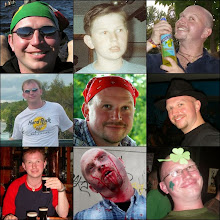Into the Favela
The day started with a slightly unwelcome surprise when, for possibly the first time ever, a Brasilian tour was early. Most of the time, things here seem to run somewhere between "manana manana" and Fiji-time, but our Favela tour, led by the marvellously irrepressible Luis, turned up early, so I was still brushing my teeth when one of the guys banged on the bathroom door to say they were about to leave! After a few pick-ups around Copacabana (and one or two in Ipanema) our minibus was full and headed off to Sao Conrado - this is the "regular" district which perches between the ocean and the favela of Rocinha, our destination. The minibus doesn´t go on into the favela, so we were out of the vehicle and loaded onto motorbike taxis. I love motos and, having not been on one since leaving Hanoi a couple of years back, was grinning like an idiot as we wound our way up the main road which cuts through the favela up to the top of the hill.
It´s a peculiarity of Rio that the hillsides, in many cities some of the most desirable property, are the location for the slums, the favelas. Our trip for the morning would take us right the way back down the hillside to where we entered by Sao Conrado. Along the way, at various points we were asked to put our cameras away and avoid taking photos for a while. This is not so much to spare the feelings of the inhabitants as it is a reflection that it is inadvisable to take photos of young men with machine-guns, who can be found in some areas near the access points. Before seeing them, you generally see the lookouts with walkie-talkies, who spread the word if police or rival gangs are approaching, an event signalled by fireworks - when this happens, it is wise to make oneself scarce very quickly. Luckily, no November 5th display for us that day.
The favelas are these days part of a semi-legal set-up - some of them have electricity meters and the like, though there are still all manner of spaghetti-like illegal connections jumping from the cables in the district. The inhabitants also don´t pay tax on their homes, as their ownership is not strictly recognised. The sewerage system is mostly of the "open drain" variety. However, there are now bus routes into the districts, and they provide an important source of affordable housing for those working in the more upmarket suburbs, so there are no attempts to remove them. Our trip took in visits to a local art project, as well as the school that is supported by the company organising the tours - the government´s grudging acceptance of the favelas´ existence means they get little or no support, so much of what is accomplished is done by charities, foundations set up by former inhabitants (e.g. some footballers and musicians) and volunteers.
Having made it safely through the favela, we headed back to our beachside suburbs, where I grabbed some lunch, in the process making the acquaintance of the prato freido, a set-meal type affair which meant that I got a bit of chicken, accompanied by rice, beans, salad, chips and an egg (spread over 2 plates...) for less than 3 quid. Given how expensive many of Rio´s restaurants are, this crossover to something more like what the cariocas eat was somewhat overdue.
After feeding, I headed off to the bus-stop again, this time headed for the neighbourhood of Cosme Velho, which is the lower terminus of the Trem do Corcovado, the funicular railway which runs up to the statue of Christ the Redeemer on the hill known as Corcovado, the bunchback. This is another of the undeniably touristy, and hence slightly overpriced, but must-do things in Rio. From a vantage point high, high up above the city (over 700m higher than the docks, at least 300m higher than Sugarloaf), you get spectacular views of the city itself, Guanabara Bay, and the beachside suburbs beyond the Rodrigo Freitas lagoon.
That evening was a relatively subdued affair, out with several other Brits from the hostel and a couple of frankly crazy Swedes. We had what was effectively another wild goose chase (again involving a cabbie trying to overcharge people amongst other things) off in search of an area reputed to have a bunch of bars to explore. Once this became a bit of a damp squib, the Swedes wanted to carry on and find a club somewhere, leaving me in the unfamiliar position of being the voice of reason arguing for going home and calling it an early night.


<< Home